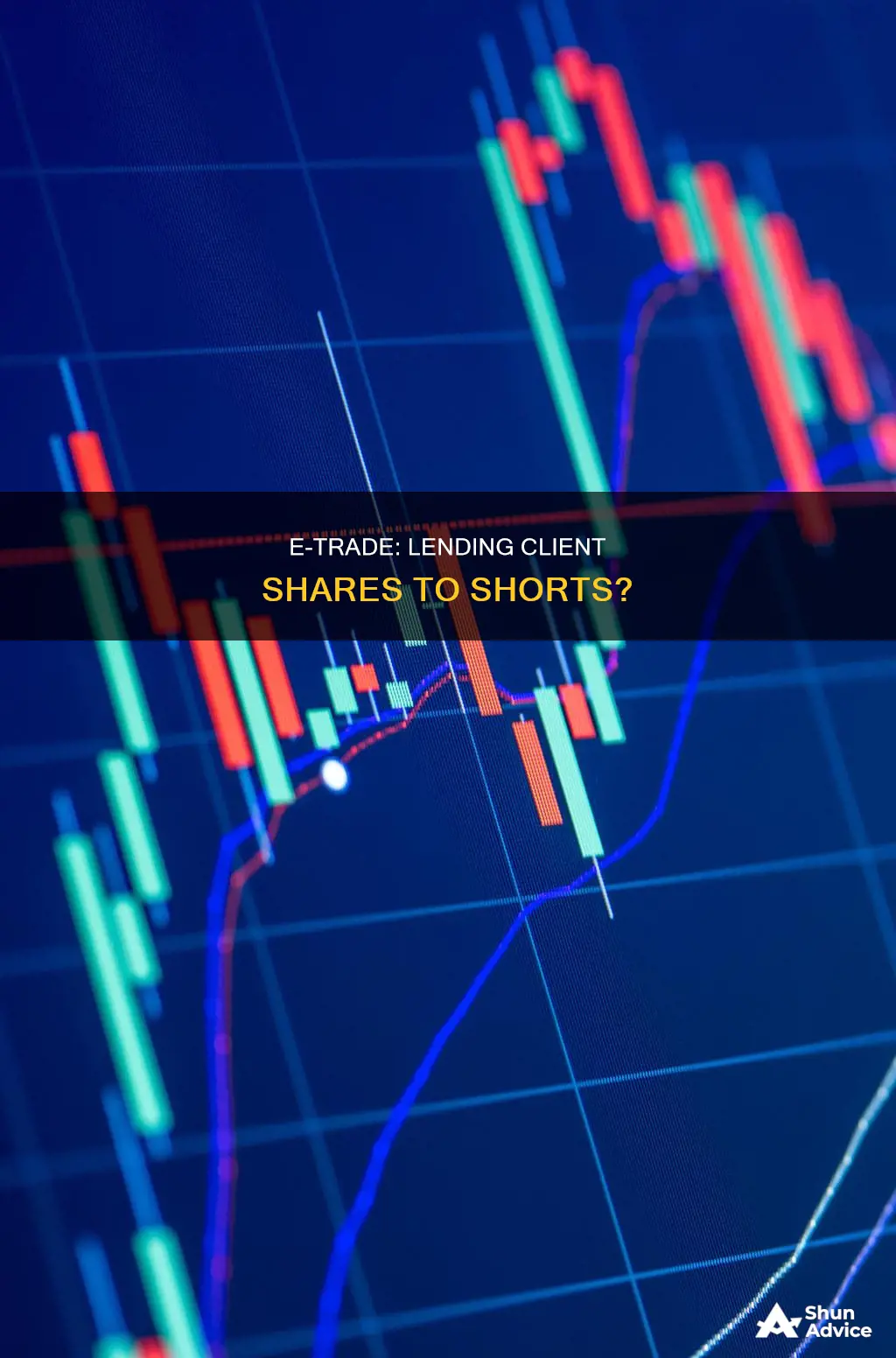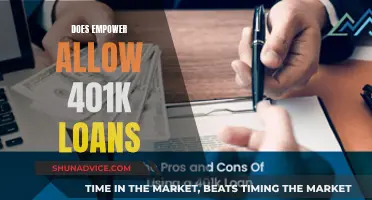
E-Trade offers a Fully Paid Lending Program that allows clients to lend their fully-paid-for securities to other investors and market participants. This is done in exchange for potential income, with E-Trade borrowing eligible securities from the client's account based on demand. While the client retains full ownership rights and can sell their shares at any time, the loaned shares can be used for short selling, which may contribute to lowering the price of the securities on loan. Short selling involves borrowing a share to sell it, expecting the price to drop so that it can be bought back at a lower price, and is considered a risky trade.
| Characteristics | Values |
|---|---|
| Does E-Trade loan out client shares to shorts? | Yes, through the E*TRADE Fully Paid Lending Program. |
| Who owns the loaned shares? | The client retains full economic ownership of the loaned shares. |
| What does the client get in return? | The client receives cash collateral equal to 102% of the daily marked-to-market value of the loaned securities, and a portion of the revenue paid to E*TRADE by the borrower of the securities. |
| How is the revenue portion calculated? | The client accrues interest daily at an annualized interest rate that is market-driven and can fluctuate based on factors like borrowing demand, market supply, and short selling. |
| When is the revenue paid? | The loan income is generally paid at the beginning of the month following the loan. |
| Can the client sell the loaned shares? | Yes, the client can sell the loaned shares at any time without restriction. However, selling the shares will terminate the loan. |
| Are there any risks for the client? | The loaned securities are not covered by the Securities Investor Protection Corporation (SIPC). Additionally, dividends paid "cash in lieu" may carry higher tax consequences in non-retirement accounts. |
| Can the client opt-out of the program? | The client can unenroll from the program at any time. |
What You'll Learn

E*TRADE's Fully Paid Lending Program
By enrolling in the program, clients agree to allow E*TRADE to borrow their fully-paid-for securities in exchange for potential income. While the securities are on loan, clients retain full ownership and can sell their shares at any time without restriction, although doing so will terminate the loan. Clients can also leave the program at any time. Any loaned shares will be visible in the client's account with a notation that they are on loan.
While on loan, the securities will earn daily interest based on an annualized rate, which is paid monthly to the client's account. The annualized lending interest rate can fluctuate daily based on factors such as borrowing demand, market supply, and short selling.
It is important to note that securities lent through the program may be used to facilitate short selling, which could contribute to lowering the price of the securities on loan. Clients will be provided with cash collateral equal to 102% of the daily marked-to-market value of the securities borrowed, which will be FDIC-insured up to $250,000 per depository account.
Disaster Loan Assistance: Impact on Unemployment Benefits
You may want to see also

How short selling works
Short selling is a trading strategy where investors speculate on a stock's decline. It involves borrowing shares from a brokerage firm, selling them on the open market, and then repurchasing them at a lower price. Short sellers profit from the difference between the selling and buying prices. While short selling can be profitable, it carries significant risks, including the potential for unlimited losses if the stock price rises instead of falling.
To engage in short selling, an investor must first establish a margin account with a brokerage firm. This account holds eligible assets, such as bonds, cash, mutual funds, or stocks, as collateral for the borrowed shares. The investor then borrows shares from the brokerage firm and sells them on the open market. The hope is that the stock price will decline, allowing the investor to buy back the shares at a lower price and return them to the brokerage firm.
The cost of borrowing shares for short selling can vary depending on factors such as supply and demand. Interest rates can be volatile, and short sellers may find themselves paying high interest rates if the shares become less liquid. Additionally, short sellers may be subject to sudden changes in fees, which can impact the profitability of their positions.
Short selling is a controversial practice as it involves betting against the success of individual companies or the market as a whole. However, economists argue that short selling makes markets more efficient and can act as a stabilizing force. It can also provide an opportunity for investors to profit during a down market.
Regarding E-Trade, they offer a Fully Paid Lending Program where clients can enrol their eligible accounts to lend their fully-paid-for securities to other investors. This program allows E-Trade to borrow clients' shares and loan them to short sellers, with the client retaining full economic ownership. Clients who participate in this program earn income through daily interest, paid monthly, and have the flexibility to sell their shares at any time.
Conforming Loan Limit: Does LTV Impact It?
You may want to see also

Risks of short selling
E-Trade's Fully Paid Lending Program allows clients to lend their fully paid-for securities to the company, which then loans them to other investors and market participants, often due to short selling. While E-Trade does loan out client shares to shorts, the client retains full economic ownership and can sell their shares at any time without restriction.
Short selling is a risky strategy that involves borrowing shares of stock from a broker and selling them at the current market price. The short seller hopes to buy the shares back at a lower price to make a profit. However, if the stock price rises, the investor loses money, and there is no limit to how high a stock price can go, so losses can be infinite. Short selling is, therefore, a risky strategy that should only be attempted by experienced investors who understand the risks involved.
The risks of short selling are as follows:
- Unlimited losses: The most significant risk of short selling is that a stock's price can theoretically rise infinitely, meaning that losses for the short seller are unlimited.
- Timing: Timing is crucial in short selling. Entering a trade too early or too late can result in infinite losses.
- Increased volatility: Short sellers can push stock prices down and increase volatility, which can be risky for other investors.
- Borrowing fees: Short selling involves borrowing shares from a broker, which requires paying a fee, usually in the form of interest.
- Margin requirements: Before short selling, investors must meet margin requirements, which can be costly. The Federal Reserve Board requires all short sale accounts to have 150% of the value of the short sale when it is initiated.
- Tax consequences: Payments-in-lieu of dividends on loaned shares may carry higher tax consequences in non-retirement accounts.
- Voting rights: When investors lend their shares, they typically lose their voting rights.
- SIPC protection: Loaned securities do not qualify for Securities Investor Protection Corporation (SIPC) protection.
- Not suitable for all investors: Short selling is a speculative strategy that may not be suitable for all investors, especially those who are not experienced or who are active traders.
- Regulatory risk: Short selling is a highly regulated activity, and regulatory changes can impact the ability to short sell and the potential profits.
Consolidating Loans: Helpful or Hindrance?
You may want to see also

Benefits of lending shares
Lending shares can be a good option for investors, offering several benefits. Firstly, it can create a safe form of passive income. By lending shares to short sellers, investors can earn additional income on stocks they already hold, without actively trading them. This is particularly beneficial for long-term hold positions that the investor does not intend to sell. The interest earned from lending shares can be higher than typical money market investments, providing an attractive return.
Another advantage of lending shares is that it can help keep the stock market honest and efficient. Short sellers, who borrow shares to sell in the expectation of a price decline, play a crucial role in market efficiency and capital allocation. Lending shares to these traders can, therefore, contribute to a more transparent and efficient market.
Share lending also provides flexibility for investors. As the owner of the shares, you maintain the right to sell them at any time, even while they are loaned out. This means that if you decide to sell your loaned stocks, you can do so without penalty, and the loan is simply terminated. This flexibility allows investors to generate potential profits from their inactive investments.
Furthermore, lending shares can be a straightforward process. Share lending programs are commonly offered by brokerages, and the rest of the work is typically automated. Investors can choose to lend individual stocks or their entire portfolio, depending on their preferences. The fees earned from lending shares are usually paid monthly, providing a regular source of income.
While there are benefits to lending shares, it is important to consider the associated risks. These include counterparty default, loss of protection, negative tax implications, and loss of voting rights. Therefore, investors should carefully evaluate their options before participating in share lending programs.
Construction Loans: Property Purchase and Development Covered?
You may want to see also

E*TRADE's role in short selling
E*TRADE offers a Fully Paid Lending Program that allows clients to earn additional income by lending their fully-paid-for securities to the company. In turn, E*TRADE loans these shares to other investors and market participants, including short sellers.
When clients enrol in the program, they agree to allow E*TRADE to borrow their fully-paid-for securities. E*TRADE then lends these shares to other investors, often short sellers, through the securities lending market. While the shares are on loan, clients retain full economic ownership and can sell their shares at any time without restriction, although doing so terminates the loan. Clients can also continue to trade as usual while their shares are on loan. Any loaned shares are visible in the client's account with a notation that the shares are on loan.
In return for loaning their shares, clients receive cash collateral equal to 102% of the daily market value of the securities borrowed, which is FDIC-insured up to $250,000 per depository account. They also accrue interest daily at a market-driven annualised interest rate, which fluctuates based on factors such as borrowing demand, market supply, and short selling. This interest is typically paid monthly to the client's account.
It is important to note that the risks and benefits of short selling primarily lie with the broker, not the individual investor. While E*TRADE's program offers potential income, it also carries risks, such as the lack of SPIC insurance. This means that if E*TRADE encounters financial trouble, the shares lent out are not protected under the Securities Investor Protection Act of 1970.
Dire Consolidation Loans: Two-Part Payment Plans?
You may want to see also
Frequently asked questions
Yes, E-Trade does loan out client shares to shorts. This is done through the E-Trade Fully Paid Lending Program, where clients allow E-Trade to borrow their fully-paid-for securities in exchange for potential income.
When you enrol in the E-Trade Fully Paid Lending Program, you agree to let E-Trade borrow your fully-paid-for securities. E-Trade then loans these shares to other investors and market participants through the securities lending market. You retain full ownership of the shares and can sell them at any time, but doing so terminates the loan.
By participating in the E-Trade Fully Paid Lending Program, you can earn additional income on your fully paid securities. You will be compensated for the duration of the time your securities are on loan, and the loan income will be paid directly to your account.
Yes, there are risks associated with lending out your shares. While you retain full ownership, your shares are subject to market risk with price fluctuations. Additionally, loaned securities do not qualify for SIPC protection, and you lose voting rights.
To enrol in the E-Trade Fully Paid Lending Program, you must have eligible accounts and meet the minimum requirement of $50,000 in eligible collateral. You can apply through the E-Trade website or seek more information from their customer service.







